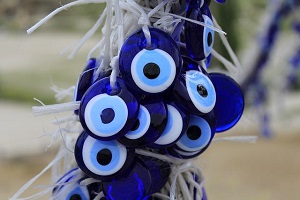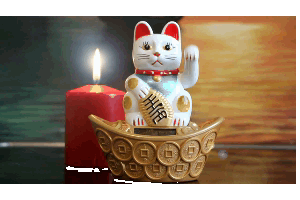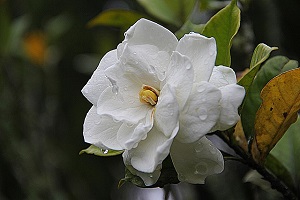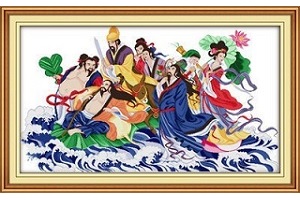The pagoda tower is one of the classic architectural structures that arouses a feeling of oriental surroundings.
We see them all the time in movies, book illustrations, and some very busy tourist attraction spots in China and Japan.
Their presence can actually be felt as well in countries like Burma, Nepal, Taiwan, Hong Kong, etc.
It is mostly known in feng shui as a temple of wisdom, peace and harmony.
As such, it is often used in association with calling for scholastic luck in academic achievements and career success.
A secondary use of it is as a form of protection by entrapping negative energy inside.
These days, the majority of pagoda products manufactured for display by consumers take on the form of the infamous Wen Chang pagoda.
Wen Chang written as 文昌 in Chinese language has a meaning of success in literature for descendants. It is also a reference to the god of literature.
Buddhists might have come across reading about how it had originally evolved from the stupa. The 6 harmonies pagoda (六和塔) in Zhejiang province of China is heavily associated with Buddhist heritage and listed as a national heritae site.
Legend of the pagoda
Sometimes known as the education tower, Many famous Chinese poems actually reference the pagoda for breathtaking scenic views, happiness in scaling them, and attribution to doing well in education, etc.
One of the classic good versus evil Chinese novels Legend of the White Snake (白蛇传) has a memorable sub-plot where Madam White Snake was confined to a pagoda while her son achieve celebrated success as a scholar and visits her at the pagoda regularly.
This is a reflection of why the pagoda tower is used in feng shui as a symbol of academic success and an emblem of protection by keeping bad energy in check.
During ancient times, as stream and rivers were common, pagodas were erected along riverbanks to capture good chi so that positive energy do not just flow down the river into the abyss.
This is especially so when the river is straight instead of curved.
Students studying or the imperial exams were also known to pray to wen chang with 4 specific types of gift offerings.
- Carrot represents luck
- Celery symbolizes diligence
- Garlic is associated with being meticulous calculating
- Scallion is related to intelligence
With the application of feng shui, the number of tiers a pagoda has bears great significance.
Lucky feng shui pagodas are usually made with 5, 7, 8 or 9 levels.
A 5 level pagoda is a mirror image to the 5 elements that make up the metaphysical world. It also serves as a protector of bad luck coming from 5 directions.
A 7 level pagoda represents the 7 treasures of Buddhism as well as symbolic of the 7 northern stars that bring career and wealth luck. This is the most common number for those seeking scholastic luck.
8 being the most auspicious number, understandably has a place here.
A 9 level pagoda signifies completeness as the nine numbers make up a whole cycle. It is best used to attract academic luck while being able to subdue bad luck and negative energy in general.
The Taipei 101 which was the world’s tallest building for a period of time is also shaped like a mega pagoda with 8 canted sections.

View from Taipei 101 with shadow in foreground
In superstition, the pagoda is also associated with being able to ward off spirits with bad intentions as they are afraid of being pulled into it and get trapped. The story of Madam White Snake as mentioned previously only lends credence to this belief.
Pagoda feng shui placement
While the placement of pagodas will not harm feng shui in any sector of the house, homeowners who have them for display at home usually have a specific reason for doing so.
And that is usually for academic success either for themselves, their children, or other household members who are studying and sitting for examinations soon.
For this reason they are generally best placed in the southeast or where the study area is located.
Otherwise, one can also refer to the trigrams and place the object at the section of the house with the trigram that represents the person who needs that scholastic luck.
For example, if the youngest son is the one meant it benefit from the power of the feng shui pagoda, then the trigram Ken in the northeast is where to place it.
And if the beneficiary is meant to be the patriarch for career development, then the trigram Chien at the northwest is where the tower should be placed. The prowess of placement in this instant might be enhanced further if it’s a jade pagoda.
However, the most potent method of placing the pagoda for academic luck is to find where the Green star 4 is located in the house according to flying star feng shui. It can be effective whether it’s a water star or mountain star.
A 1-4 combination would be most desirable for this purpose.
For feng shui cures and remedies, the 5 element pagoda is also often used as a protection from the 5 yellow misfortune star. In this case, one made of metal material would do best.
Otherwise, more casual placements of it include:
- At the work desk to as protection from colleagues with hidden agendas and office politics
- Near the front door as a doorman to refuse the entry of negative energy
- Displayed behind the chair for support
- At the bedside for those in school for better grades
- At the study table for better concentration
- Carried around as a key-chain or pendant
- etc
Just be mindful not to leave them on the ground as they might become safety hazards instead.















